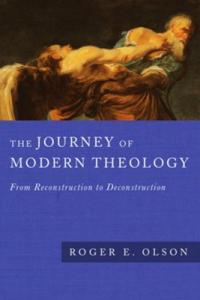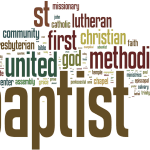The Journey of Modern Theology (New Edition)
I received in the “mail” (some delivery method) a box containing three paperback copies of my magnum opus: The Journey of Modern Theology: From Reconstruction to Deconstruction (InterVarsity Press). I was surprised again at its length. I suppose that hinders its sales. 700 plus pages! I have trouble believing I wrote it! How did I do that?
Backstory: My first published book was 20th Century Theology: God and the World in a Transitional Age, co-authored with the late Stanley Grenz (IVP). Some years after its publication, the publisher asked me to write a sequel to it about 19th century theology. I countered that I would write a whole new book to replace 20th Century Theology as I thought it was flawed. They agreed. I re-wrote all the chapters in 20th Century Theology and added much material about both 19th and 20th century theology, adding some about 21st century theology.
I thought this would replace 20th Century Theology but the good folks at IVP kept publishing that earlier book alongside “Journey.” If I may say so myself, Journey is a much better book. Apologies to my late friend Stan.
Some professors are still using 20th Century Theology. I wish they would at least consider using Journey.
Journey has some new recommendations/endorsements on it. I’m deeply grateful to all who wrote them—originally and for the new paperback edition. They are all very strong endorsements from very well-qualified scholars of modern Christian thought.
Why did I write 20th Century Theology and then The Journey of Modern Theology? I taught modern/contemporary Christian theology for years before writing my part (about half) of 20th Century Theology. I also taught the subject after that book was published. “Journey” was based on my lecture notes and my notes from reading modern theologians.
I decided to change the theme from God’s transcendence and immanence to Christian theological wrestlings with modernity and postmodernity.
The Journey of Modern Theology is, if I may say so, the best one volume critical survey of major Enlightenment thinkers and their influences on 19th and 20th century Christian theologians from Friedrich Schleiermacher to Stanley Hauerwas. The last chapter is about deconstructionism with focus on John (Jack) Caputo, the main American religious follower of Jacques Derrida.
I’m proud of this book even though I don’t remember writing it. I still wonder how I did that! All I remember is writing the whole book during a one-semester sabbatical at Bethel College (now Bethel University).
My main reason for writing this blog post is to encourage professors of modern/contemporary theology to adopt Journey as their textbook.
*Note: If you choose to comment, make sure your comment is relatively brief (no more than 100 pages), on topic, addressed to me, civil and respectful (not hostile or argumentative), and devoid of pictures or links.*














